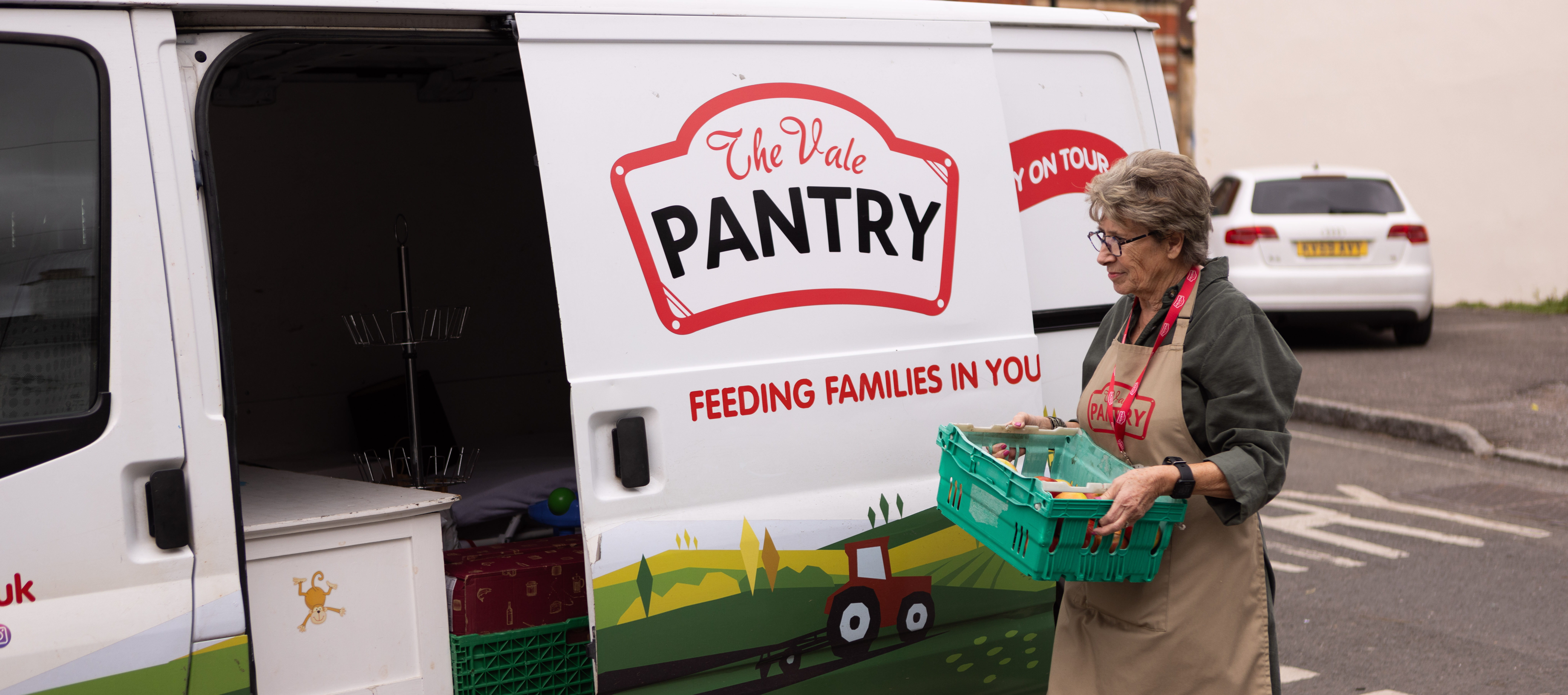
Supporting Rural Communities
Our new UK-wide grant programme
Our new, differentiated UK-wide grant scheme is now open for expressions of interest. For more details about the programme, click here.
The Royal Countryside Fund remains one of very few funders focused on rural communities across the UK.
Our mission is to empower rural communities to develop community-led solutions that increase their resilience and sustainability. We want to see thriving rural communities that contribute to a sustainable future for the countryside.
Following the launch of our new strategic plan in 2024, we want to build on all that we have achieved through our work with rural communities by adopting a more holistic approach to support; facilitating, connecting, and funding, with a focus on long term sustainability. Our aim is to “power up, not prop up” communities, to inspire change and encourage economic vibrancy.
We will be developing and testing new approaches of support over the coming year. The first stage of our new programme is supporting rural communities in Cumbria and Northumberland in partnership with The National Lottery Community Fund.
We will be launching our new, differentiated UK-wide grant scheme on Friday 10th January 2025. For more details about the programme, click here.
We will be releasing further information about our programmes shortly. If you haven’t already signed up for updates and would like to be notified when further news is available, please enter your email.
Projects we’ve supported:
Grizedale Arts and The Farmer’s Arms
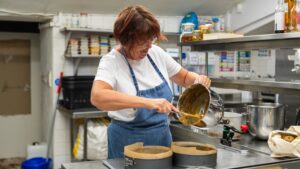 The project: In collaboration with the community, turned an old pub into a dynamic, creative and industrious rural hub through learning and skill exchanges, business development and volunteer placements.
The project: In collaboration with the community, turned an old pub into a dynamic, creative and industrious rural hub through learning and skill exchanges, business development and volunteer placements.
Themes: Powering up rural communities.
What we liked about it: This project had significant reach and impact, with strong quantitative and qualitative evidence of need in the form of survey results, monitoring & evaluation data and testimonials. They went beyond simply purchasing the pub and used community consultation to turn it into a hub providing a range of services. Their programmes aim to provide education and social engagement opportunities in wide-ranging skills; support business start-up programmes to encourage entrepreneurship and a circular local economy that supports local business recovery; encourage environmental stewardship and biodiversity on the inn’s land; champion new green energy ideas and support other local businesses to do the same. They also connect the resources held within rural spaces globally with a learning exchange programme that maintains and enhances the value of rural life, inviting other communities to collaborate.
Blackhall Mill Community Association
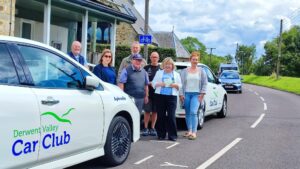 The project: Development of a scalable model of their community EV car club. Building on research they have conducted, this innovation will accelerate the speed at which they can support the development of new clubs, decarbonise transport, improve accessibility and strengthen the sustainability of the club for their community
The project: Development of a scalable model of their community EV car club. Building on research they have conducted, this innovation will accelerate the speed at which they can support the development of new clubs, decarbonise transport, improve accessibility and strengthen the sustainability of the club for their community
Themes: Environmental sustainability; Powering up rural communities.
What we liked about it: This activity demonstrates clear replicability and is highly innovative, providing significant additional benefits alongside improving access to transport in their isolated community. Additional benefits include generating an income stream for the community, ensuring the future long-term viability of the club, helping to decarbonize transport and reducing isolation and loneliness. This organisation also demonstrates good collaboration and connectedness with others in their local area and they identified a clear need for the project within their own community and further afield.
Knoydart Farm CIC
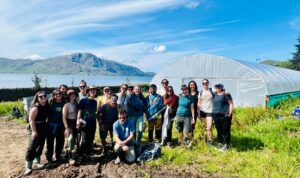 The project: A community led project set up to address issues of food insecurity and cost on this remote Scottish peninsula. Food deliveries to the area are via boat so they are vulnerable to delays and come at a high price and a substantial carbon footprint. The community farm has created new employment opportunities for young people and is contributing to a greener, circular economy, supplying fresh produce to local businesses. The farm has also become a community hub where local people of all ages can connect with sustainable agriculture and food production.
The project: A community led project set up to address issues of food insecurity and cost on this remote Scottish peninsula. Food deliveries to the area are via boat so they are vulnerable to delays and come at a high price and a substantial carbon footprint. The community farm has created new employment opportunities for young people and is contributing to a greener, circular economy, supplying fresh produce to local businesses. The farm has also become a community hub where local people of all ages can connect with sustainable agriculture and food production.
Themes: Powering up rural communities; environmental sustainability; emergency resilience; keeping young people in the countryside.
What we liked about it: Knoydart Farm was developed in response to a clear need arising from rural isolation, which was identified as a priority through community consultation. The project is working towards all four of our Supporting Rural Communities themes and is cultivating a more connected, resilient and sustainable community.
Black Mountains College, Brecon Becons
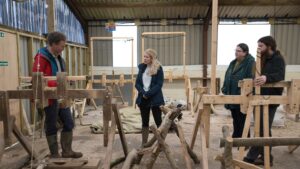 The project: Black Mountains College is an innovative education institution based on Troed yr Harn Farm in Talgarth in the Brecon Beacons. Their work centres around climate action and adaptation, using nature as the classroom. The idea for the college arose from concerns around the impact of climate change on every community, including rural semi-isolated communities such as Talgarth. The RCF grant went towards a course coordinator, to deliver community-based vocational training and short courses, work with local organisations to strengthen community provision and create new community spaces which are accessible to everyone.
The project: Black Mountains College is an innovative education institution based on Troed yr Harn Farm in Talgarth in the Brecon Beacons. Their work centres around climate action and adaptation, using nature as the classroom. The idea for the college arose from concerns around the impact of climate change on every community, including rural semi-isolated communities such as Talgarth. The RCF grant went towards a course coordinator, to deliver community-based vocational training and short courses, work with local organisations to strengthen community provision and create new community spaces which are accessible to everyone.
Themes: Powering up rural communities; Environmental sustainability; Keeping young people in the countryside.
What we liked about it: BMC carried out wide consultation to determine which courses were most needed and works closely with other local organisations to strengthen community provision and facilitate economic clustering. Through their courses they also create new community spaces (orchards, woodlands, gardens, meadows) which are accessible to everyone and are aiming to establish a model circular economy which could be replicated in other communities across the UK.
Countryside Learning Scotland
 The project: Based in Perthshire, Countryside Learning Scotland (CLS) are an education charity formed in 2003 to meet the need for outdoor learning in secondary schools.
The project: Based in Perthshire, Countryside Learning Scotland (CLS) are an education charity formed in 2003 to meet the need for outdoor learning in secondary schools.
The RCF awarded CLS £12,500 in Spring 2023 for their project ‘Pathways to Rural Work’ which aimed to increase career awareness and opportunities for young people in Gairloch, Kinlochbervie and Ullapool highschools.
This project sought to address the issue of a severe shortage of job candidates across rural businesses, affecting business operational hours. A lack of awareness of job opportunities amongst young people and a disconnect between them and their local environment meant young people were leaving rural areas for urban settlements. CLS wanted to build relationships between secondary schools and local businesses to enable pathways to work.
Their delivery plan was based on a programme of awareness raising, specialist courses linked to the curriculum and local industries, hands on skills and work placements and training for local businesses to enable them to support young people in the workplace. They also delivered CPD training to teachers to equip them to teach/develop rural skills.
Themes: Powering up rural communities; Environmental sustainability; Keeping young people in the countryside.
What we liked about it: A really innovative project that aimed to address the disconnect between businesses, young people and the local environment. This project not only benefitted the young people involved, but also the local economy and community. It had clear scalability and replicability and a multi-faceted approach to addressing an identified need in the local community.
Happiness Grants
Waitrose & Partners provides additional support to projects and organisations with our new Happiness Grants initiative. In 2024, we’re supporting two transformative projects making an impact in rural Britain: The Vale Pantry in North Dorset and North Norfolk Community Transport.

Supporting Rural Communities in Cumbria and Northumberland
New funding of £500,000 is available from The Royal Countryside Fund, supported by The National Lottery Community Fund, to deliver transformative, community-led initiatives in rural parts of Cumbria and Northumberland, unlocking the huge potential for positive change in these counties.
This is the first county-based programme run by the Royal Countryside Fund, designed to support the unique challenges and opportunities that exist in rural Cumbria and Northumberland. Our aim is to unlock innovative solutions that will “power up, not prop up” communities, inspiring change and encouraging economic vibrancy.
This programme has now closed for expressions of interest.
To find out more, please follow the links below for the programme in each county:
360Giving
The Royal Countryside Fund is committed to transparency and we work with 360Giving to publish information about our grants. 360Giving is an initiative that aims to help UK funders publish their data in an open and standard format online. You can explore our grant-making, and that of over one hundred other funders, using 360Giving’s GrantNav and Insights tools.
Using the 360Giving Data Standard, our awarded grants since 2022 are available to download as an excel file here.
This work is licensed under the Creative Commons Attribution 4.0 International License. This means the data is freely accessible to anyone to be used and shared as they wish. The data must be attributed to The Royal Countryside Fund.
We believe that with better information, funders can be more effective and strategic decision makers. 360Giving supports funders to publish open data about their grants and empowers people to use this data to improve charitable giving through a range of free online tools. For more information, visit the 360Giving website.

Village Survival Guide
Want to get your community up and running? Our Village Survival Guide offers hints, tips, and practical advice from people who’ve made a real difference in their rural community. Purchase yours today!

Other sources of funding
- We recommend looking at the small grant programme at King Charles III Charitable Fund (KCCF). The small grants programme supports projects across six funding themes: Heritage and Conservation, Education, Health and Wellbeing, Social Inclusion, Environment, and Countryside. You can find out more about KCCF’s work, the small grants eligibility criteria and application process here.
- The UK network of Community Foundations brings people and organisations together through charitable grant making in their local areas. Find your local Community Foundation here: Find your local community foundation | UKCF
- The National Lottery Community Fund distributes over £600m a year to communities across the UK through a range of programmes. Find more information here.
- Local voluntary sector support organisations often advise on sources of funding. These include your local NAVCA or ACRE member organisation (England); Third Sector Support Wales; The Scottish Council for Voluntary Organisations and Northern Ireland Council for Voluntary Action.
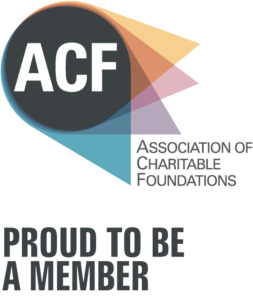
We are grateful to players of People’s Postcode Lottery and The National Lottery Community Fund for their ongoing support.


